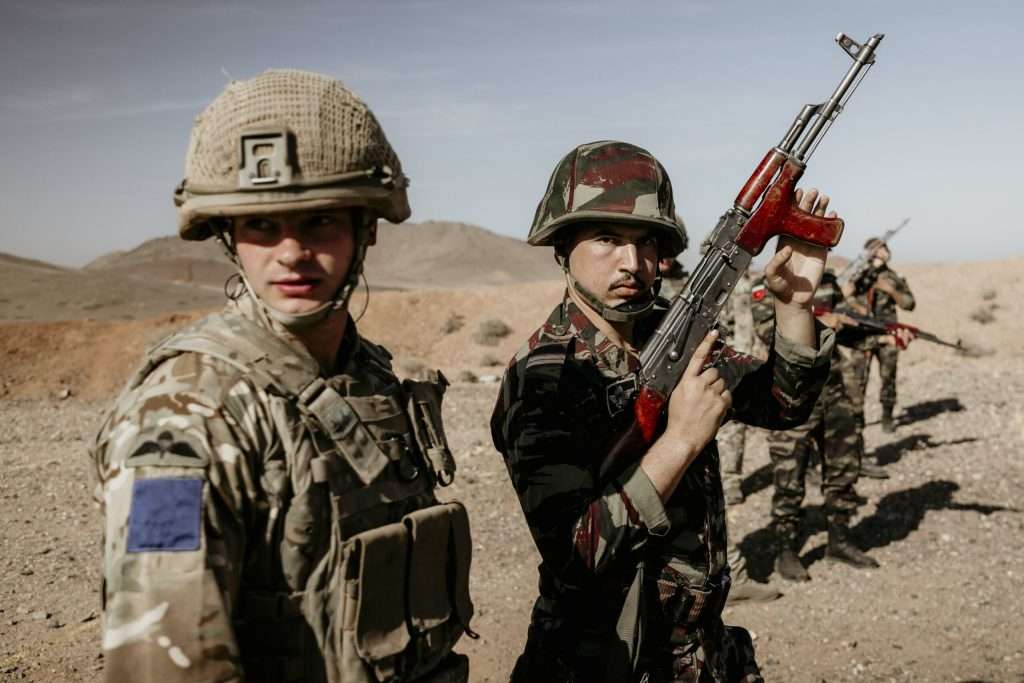U.S weapons deal with Morocco could mark a regional Arms Race

A Moroccan soldier awaits commands from the Range Control Officer. Soldiers from the British Army’s global response force are putting their desert warfare skills to the test alongside their Moroccan counterparts. Exercise Jebel Sahara has seen Colchester-based A Company, 2nd Battalion The Parachute Regiment working in Morocco alongside troops from 2e Brigade d'Infanterie Parachutiste. For the British paratroopers, the three-week-long exercise near Marrakech provides an opportunity to learn from the Moroccan troops’ greater experience of operating in the hot, dry and demanding conditions of the desert. In return, they have shared with the Moroccans their hard-earned skills in patrolling, both on foot and in vehicles; marksmanship; demolitions; and casualty care. Troops also worked together to hone their fire and manoeuvre tactics on live-fire battle runs, and practised air assault operations from Moroccan helicopters. The exercise culminates in a six-day war game with British and Moroccan troops fighting side-by-side to capture an airstrip to use as a base to launch strike operations from. Morocco is a long-standing partner for the UK in North Africa, with the first bilateral Exercise Jebel Sahara held in 1989. Training together helps build shared skills and relationships between British and Moroccan troops to improve their ability to operate together in future.
Amid regional instability, an arms race might be brewing in the Maghreb as Morocco has just secured hundreds of millions of dollars worth of advanced weaponry from the U.S., much to the alarm of its long-time regional rival, Algeria.
The deal, announced by the U.S. Defense Security Cooperation Agency, supplies the North African Kingdom with $260 million worth of Javelin anti-tank missiles. Besides missiles and launch units, the U.S. has agreed to provide technical assistance, training programs, and logistical support to bolster Morocco’s defenses, reports the New Arab plus Agencieson June 3.
For Morocco, its ongoing efforts to modernize its military underscore a deepening diplomatic crisis with Algeria, the crux of which is the fate of Western Sahara. While Rabat declares its sovereignty over the region, Algeria champions Sahrawi independence, backing separatist groups that Morocco deems terrorists.
In 2020, the Polisario Front, a key independence movement, renounced a 30-year ceasefire, bringing the old foes to direct confrontation. Both nations have since ramped up military expenditures, with Algeria allocating 25.1 billion dollars to defense in 2025, and Morocco 13.32 billion dollars.
Recently, on June 4, tensions flared as a Moroccan Royal Armed Forces (FAR) drone destroyed an Algerian truck in north-eastern Western Sahara, killing three men on board.
The arms deal follows other significant purchases from the U.S. In April, Rabat finalised an $825 million agreement to acquire 600 Stinger Block I surface-to-air missiles and support equipment. Other significant purchases include 24 Apache attack helicopters and F-16 fighter jets, aimed at strengthening Morocco’s air defence against short-range threats positioning Morocco as a leading African client of the U.S. defense industry.
This aligns with the broader U.S. strategy to strengthen the defense capabilities of key non-NATO allies. Morocco, the so-called “gateway to Africa,” is of key geostrategic importance to the United States.
Situated between Europe, the Sahel, and the Middle East, the kingdom is a key counterweight to Russian and Chinese influence in the Arab World and a bulwark against the rising tide of militancy in the Sahel.
While the U.S. asserts that the sale will not alter the regional military balance, the introduction of advanced weaponry could have unintended consequences.
The New Arab/ Agencies/ Maghrebi
Want to chase the pulse of North Africa?
Subscribe to receive our FREE weekly PDF magazine













